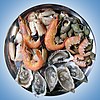Partridge
| Partridge | |
|---|---|
 | |
Crested wood partridge (Rollulus rouloul) | |
Scientific classification | |
| Kingdom: | Animalia |
| Phylum: | Chordata |
| Class: | Aves |
| Order: | Galliformes |
| Family: | Phasianidae Horsfield, 1821 |
| Subfamily: | Perdicinae Horsfield, 1821 |
| Genus | |
Alectoris | |
Partridges are medium-sized non-migratory birds, with a wide native distribution throughout the Old World, including Europe, Asia, and parts of Africa. They are sometimes grouped in the Perdicinae subfamily of the Phasianidae (pheasants, quail, etc.). However, molecular research suggests that partridges are not a distinct taxon within the family Phasianidae, but that some species are closer to the pheasants, while others are closer to the junglefowl.[1]

Birds of Persia luchas, called būqalamūn (بوقلمون turkey in Persian), and partridges

The so-called "Vučedol dove", one of the most well-known emblems of the prehistorical Vučedol culture, is now interpreted as representing a male partridge as a symbol of fertility
Contents
1 Description
2 Range and habitat
3 Hunting
4 Cultural references
5 Species list in taxonomic order
6 See also
7 References
8 External links
Description
These are medium-sized birds, intermediate between the larger pheasants and the smaller quail.
Range and habitat
Partridges are native to Europe, Asia, Africa and the Middle East. Some species are found nesting on steppes or agricultural land, while others species prefer more forested areas. They nest on the ground and have a diet consisting of seeds, grapes and insects.
Hunting
Species such as the grey partridge and the red-legged partridge are popular as game birds, and are often reared in captivity and released for the purpose of hunting. For the same reason, they have been introduced into large areas of North America.

Red-legged partridge.

Chestnut-bellied partridge.

Scaly-Breasted Partridge.

Grey partridge.
Cultural references
According to Greek legend, the first partridge appeared when Daedalus threw his nephew, Perdix, off the sacred hill of Athena in a fit of jealous rage. Supposedly mindful of his fall, the bird does not build its nest in the trees, nor take lofty flights and avoids high places.[2]
A famous reference to the partridge is in the Christmas carol, "The Twelve Days of Christmas".[3] The first gift listed is "a partridge in a pear tree", and these words end each verse. Since partridges are unlikely to be seen in pear-trees (they are ground-nesting birds) it has been suggested that the text "a pear tree" is a corruption of the French "une perdrix".[citation needed]
The partridge has also been used as a symbol that represents Kurdish nationalism. It is called Kew. Sherko Kurmanj discusses the paradox of symbols in Iraq as an attempt to make a distinction between the Kurds and the Arabs. He says that while Iraqis generally regards the palm tree, falcon, and sword as their national symbols, the Kurds consider the oak, partridge, and dagger as theirs.[4]
Species list in taxonomic order
- Genus Lerwa
Snow partridge, Lerwa lerwa
- Genus Tetraophasis
Verreaux's monal-partridge, Tetraophasis obscurus
Szechenyi's monal-partridge, Tetraophasis szechenyii
- Genus Alectoris
Arabian partridge, Alectoris melanocephala
Przevalski's partridge, Alectoris magna
Rock partridge, Alectoris graeca
Chukar, Alectoris chukar
Philby's partridge, Alectoris philbyi
Barbary partridge, Alectoris barbara
Red-legged partridge, Alectoris rufa
- Genus Ammoperdix
See-see partridge, Ammoperdix griseogularis
Sand partridge, Ammoperdix heyi
- Genus Perdix
Grey partridge, Perdix perdix
Daurian partridge, Perdix dauurica
Tibetan partridge, Perdix hodgsoniae
- Genus Rhizothera
Long-billed partridge, Rhizothera longirostris
Hose's partridge، Rhizothera dulitensis
- Genus Margaroperdix
Madagascar partridge, Margaroperdix madagascarensis
- Genus Melanoperdix
Black wood-partridge, Melanoperdix nigra
- Genus Xenoperdix
Rubeho forest partridge, Xenoperdix obscuratus
Udzungwa forest partridge, Xenoperdix udzungwensis
- Genus Arborophila, the hill partridges
Hill partridge, Arborophila torqueola
Sichuan partridge, Arborophila rufipectus
Chestnut-breasted partridge, Arborophila mandellii
White-necklaced partridge, Arborophila gingica
Rufous-throated partridge, Arborophila rufogularis
White-cheeked partridge, Arborophila atrogularis
Taiwan partridge, Arborophila crudigularis
Hainan partridge, Arborophila ardens
Chestnut-bellied partridge, Arborophila javanica
Grey-breasted partridge, Arborophila orientalis
Bar-backed partridge, Arborophila brunneopectus
Orange-necked partridge, Arborophila davidi
Chestnut-headed partridge, Arborophila cambodiana
Red-breasted partridge, Arborophila hyperythra
Red-billed partridge, Arborophila rubrirostris
Scaly-breasted partridge, Arborophila chloropus
Chestnut-necklaced partridge, Arborophila charltonii
Sumatran partridge, Arborophila sumatrana
Vietnam partridge, Arborophila merlini
- Genus Caloperdix
Ferruginous partridge, Caloperdix oculea
- Genus Haematortyx
Crimson-headed partridge, Haematortyx sanguiniceps
- Genus Rollulus
Crested partridge, Rollulus roulroul
- Genus Bambusicola
Mountain bamboo partridge, Bambusicola fytchii
Chinese bamboo partridge, Bambusicola thoracica
See also
Dick Potts, English ecologist and specialist in the partridge.
References
^ "Molecular phylogenetics and evolution: A molecular phylogeny of the pheasants and partridges". Molecular Phylogenetics and Evolution. 11: 38–54. doi:10.1006/mpev.1998.0562. Retrieved 2015-12-25..mw-parser-output cite.citation{font-style:inherit}.mw-parser-output .citation q{quotes:"""""""'""'"}.mw-parser-output .citation .cs1-lock-free a{background:url("//upload.wikimedia.org/wikipedia/commons/thumb/6/65/Lock-green.svg/9px-Lock-green.svg.png")no-repeat;background-position:right .1em center}.mw-parser-output .citation .cs1-lock-limited a,.mw-parser-output .citation .cs1-lock-registration a{background:url("//upload.wikimedia.org/wikipedia/commons/thumb/d/d6/Lock-gray-alt-2.svg/9px-Lock-gray-alt-2.svg.png")no-repeat;background-position:right .1em center}.mw-parser-output .citation .cs1-lock-subscription a{background:url("//upload.wikimedia.org/wikipedia/commons/thumb/a/aa/Lock-red-alt-2.svg/9px-Lock-red-alt-2.svg.png")no-repeat;background-position:right .1em center}.mw-parser-output .cs1-subscription,.mw-parser-output .cs1-registration{color:#555}.mw-parser-output .cs1-subscription span,.mw-parser-output .cs1-registration span{border-bottom:1px dotted;cursor:help}.mw-parser-output .cs1-ws-icon a{background:url("//upload.wikimedia.org/wikipedia/commons/thumb/4/4c/Wikisource-logo.svg/12px-Wikisource-logo.svg.png")no-repeat;background-position:right .1em center}.mw-parser-output code.cs1-code{color:inherit;background:inherit;border:inherit;padding:inherit}.mw-parser-output .cs1-hidden-error{display:none;font-size:100%}.mw-parser-output .cs1-visible-error{font-size:100%}.mw-parser-output .cs1-maint{display:none;color:#33aa33;margin-left:0.3em}.mw-parser-output .cs1-subscription,.mw-parser-output .cs1-registration,.mw-parser-output .cs1-format{font-size:95%}.mw-parser-output .cs1-kern-left,.mw-parser-output .cs1-kern-wl-left{padding-left:0.2em}.mw-parser-output .cs1-kern-right,.mw-parser-output .cs1-kern-wl-right{padding-right:0.2em}
^ Holmes, Richard (2013). Falling Upwards: How We Took to the Air. HarperCollins. p. 1760. Retrieved 16 April 2013.
^ The Associated Press (November 26, 2012). "'12 days of Christmas' cost: How much is a partridge in a pear tree?". The Christian Science Monitor. Retrieved 8 May 2014.
^ Kurmanj, Sherko (2014). "The Roots of Modern Kurdish Nationalism". In Bengio, Ofra. Kurdish Awakening: Nation Building in a Fragmented Homeland. University of Texas Press. p. 96. ISBN 978-0-292-75813-1.
External links
| Look up partridge in Wiktionary, the free dictionary. |
| Wikimedia Commons has media related to Partridge. |
Videos, photos and sounds - Internet Bird Collection


